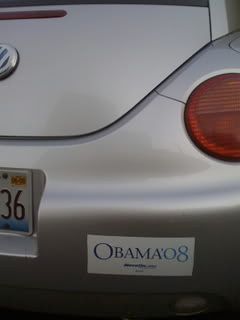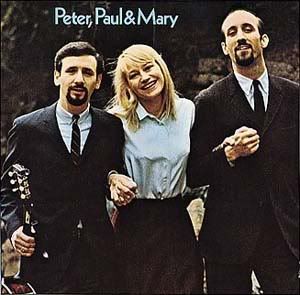
Well, I did it. I put an Obama sticker on my car.
It's not as if I don't want Obama to be the next President. It's just that I'm reluctant to get my hopes up about his getting elected. The fact that people are wowed by McCain's choice of Palin makes me feel the way I did in 1980, standing in the livingroom of my dorm with everyone watching the election returns for Reagan. I just couldn't believe it at the time. Couldn't people see that this guy was an idiot? What was wrong with America?
So when the Palin surge happened, I looked at the Obama sticker sitting on the hall table and felt like I probably should use it. I don't think I've ever put a political sticker on my car. Even if I want a candidate to win, I don't usually identify with any of them enough to want to have them become a permanent part of my self-presentation on the road. They are all straight, all male (except for Hillary), and all againt same-sex marriage (including Hillary). Most of them say what they think America wants to hear, including pandering to Christian conservatives in a way that makes me want to throw up (Hillary most certainly did this). I view elections more as damage control than any expression of MY ideals or MY politics.
Indeed, the only sticker on my car is an HRC "equals" sign I've modified to look like the mathematical symbol for "greater than." As my friend Danny pointed out when HRC first started using the gold parallel lines on a blue field to signify what is supposed to be the political goal of all LGBTQ people, why settle for equality when you can transform the world?
As a tribute to Danny's ability to dream big, I put my "greater than" symbol on the car, hoping that it would make me dream big, too. And today--inexplicably, perhaps-- I decided maybe we could dream big with Obama. Why not? I don't actually believe he's going to change things all that much, but I'm going to pretend that he is, and that universal health care, federal recognition of same-sex families, the end of the war in Iraq, and major investment in alternative energy is really going to happen in the next four years.
In the meantime, I'm trying to get my class I'm teaching to have political discussions without getting angry, polarized, and disrespectful of each other's views. I'm teaching an LGBT history and political change class, and in my efforts to get them engaged, I think I've loosed a whirlwind. We did some reading from Eric Marcus's Making Gay History, and we watched the Four-part PBS/Channel 4 series from the early 90s called A Question of Equality. I think Isaac Julien either made it all or helped on it a lot, because it is definitely hip and decidedly not from the usual white, middle-class point-of-view that gay history usually gets told from. Julian interviewed the drag queens and gays and lesbians of color who took part in the pre- and post-Stonewall LGBT movement to paint a sensitive portrait of the dynamic relationship between coalition and difference in LGBTQ political organizations. I taped the series when I was in grad school because I thought it would be great for an LGBT studies class, and I used to teach it a lot. When GF started teaching LGBT content she used it. It got so popular that her school tranferred it to DVD, though the copy is a little washed out. In my class, as it is usually, students were really engaged with the reading and the film, but the discussion got heated at one point, with a couple of white, privileged women's studies students berating the class for not understanding standpoint theory and their own privilege. Sigh. At one point a couple of students turned on an ROTC student and asked him to defend his position on--I don't know--the war? Conservatism? I'm not sure where they were going, except that at one point there had been an intelligent evaluation of the vulnerability of radical political groups to splinter over differences. Then, suddenly, the class was splintering over differences.
I was just about to intervene in the discussion when another student made a joke about the ROTC guy speaking for all military personnel, which was a sensitive way of defusing things, I thought, and of being sarcastic about the women's studies students singling him out. Also, he seemed eager to defend his point of view, and actually argued that the class shouldn't assume everyone shared the same political beliefs, class background, or moral philosophy, which was I thought a great thing to point out.
I'm making it sound a bit chaotic, which it really wasn't, because I was making them address the issues brought up in the reading and the film, and afterwards I thought it had been really performative of exactly the kinds of differences that we were studying. Then a student with a pierced lip buttonholed me afterwards and said she was shocked, shocked! by the fact that the class had called out the ROTC guy. I explained to her that I thought the other students had defused it, and that he seemed happy to have the opportunity to explain his point of view--to which they listened--and how all in all I thought it had been a successful class, if harrowing. The student also claimed to have seen other students text messaging during the film, and even chewing tobacco. I just looked at her. While I try to make sure the class is never disruptive, I really can't monitor people very well when we are watching a movie IN THE DARK. And I laughed to myself about the tobacco. Really? Is this where student rebellion is at these days--sneaking dip during class?
Seriously, I forgot that teaching can drive you batshit crazy sometimes. And that students expect you to be their mother, or the mother of everyone else. And that they are supercilious even thought they have pierced lips. And that many of them are perfectly comfortable telling you you aren't doing your job of making them feel comfortable. And you can feel bad, because on the one hand, you want them to have a real discussion, without having be watered down and censored so that it feels fake, but you also realize that they could use a good lesson in rhetorical (and other) accommodation, and be reminded that a classroom is not, in fact, the same as a political organization. But this is exactly the reason some people love teaching women's and gender studies classes, and others won't touch 'em with a 10-foot pole.
I found this truly disturbing, because Pierced Lip and I obviously had totally different experiences of the class. I also felt disrespected, because when I passed her in the hall again, in an empty building at 9 o'clock at night, she wouldn't look at me, but instead busily texted someone on her phone. Weird.
This week, Bayard Rustin! We'll see how they do with that. I haven't taught a GWS course in so long, I forgot how heated people get, and how it can make you long for the impersonality of literature.
GF puts it differently. She says it's just hard to care, and it always surprises--and annoys--us that they do. She is being funny, of course, but there is some truth in what she says.
GF is off getting her tenure file together in a coffeeshop. Little pixie baby is asleep in her swing. After exhausting all possible remedies, including food, diaper change, mobile-watching, lying on a play mat, swinging and swaying in my arms, and singing songs, I finally settled her down in front of the Michigan State football game, and she quieted down, watched it with some interest for a few minutes, and fell asleep. I think maybe she's really just a middle-aged man trapped in the body of a baby.
Which is way better and less dangerous than being a baby trapped in the body of a middle-aged man. SInce McCain is acting a lot like that these days, I'm going to try to care about politics just long enough to get a grownup in the White House. And maybe watch a little college ball with Maude.
